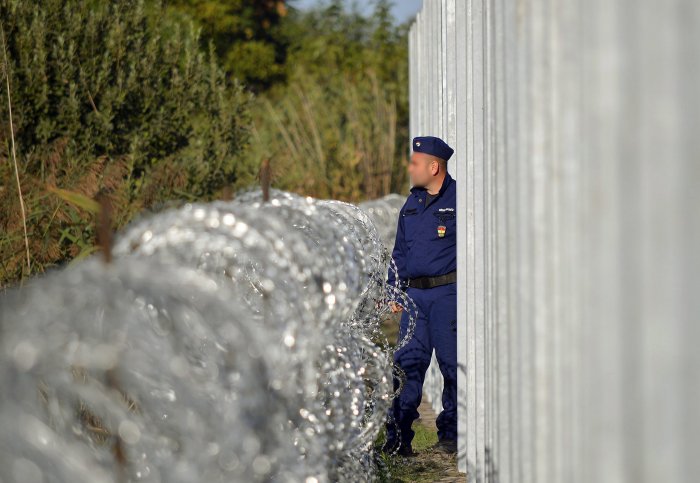Sporting Rose-tinted Glasses, but not all the Time

In a neat piece of historical symmetry, two anniversaries marking important milestones in Hungarian history have just slipped by, not that the current administration seemed to notice.
Fifteen years ago this month, Hungary achieved what for many politicians, diplomats, one-time dissidents and just ordinary Hungarian folk had been a lifetime’s ambition: on May 1, 2004, the country became an accepted member of the “club” of Western European nations: the European Union.
Fifteen years (minus one day) previous to this, the “reform” communist government had, on May 2 1989, begun dismantling the barbed wire fence separating Hungary from Austria. The “Iron Curtain”, so symbolic of the division of Europe since World War II, was on its way to the scrapyard.
Perhaps because the accession process for EU membership had been so drawn out and, at least to those not involved, free of angst, the more recent event has not really gripped the public’s imagination.
Sure, there were official celebrations at the time, and some Magyars will have grabbed the chance to work in countries like the United Kingdom and Ireland that opened their doors to settlement from the off. But by 2004, Hungary seemed well on the road to “normalization”, and somehow EU accession felt something of a “given”, hence failing to impinge itself greatly on the national consciousness.
In contrast, for those old enough to remember, the dismantling of the Iron Curtain was an iconic event that ushered in a summer of happy tumult, East German refugees, abandoned Trabants and, a year later, Hungary’s first genuinely free elections.
Yet the harsh economic realities of the early 1990s, when many local businesses closed through lack of sales, soon brought about second thoughts and a yearning among many for the seeming certainties of the previous era.
Rising Prices
People looked at the rising prices in horror, forgetting that just a few years previously they had to pay for a (poor quality) car and then wait four years before being able to turn the ignition. Foreign investors also came in for criticism: allegations swirled of worker exploitation, of enjoying excessive tax breaks, of buying and closing plants to capture markets and, at worst, plain shysterism.
Were such accusations true? In some cases, probably. At the same time, protests from foreign managers that staff expected handsome rewards while continuing to use their workplace as a private office to manage freelance activities fell on deaf ears. Everyone certainly wanted higher pay, but not all were aware of the expectations that accompanied such remuneration.
With time, and rising salaries, such resentments have largely disappeared. Today, Hungarians intent on a big pay packet can freely work in Western Europe.
Post-EU accession, a certain disappointment with Union membership has also taken hold in Hungary. In a recent public survey by Závecz Research for website 24.hu, respondents were asked to rate how their expectations of membership had been met on a five-point scale. The average grade was 3.2, dropping to just 3.0 for the rural population with only primary school education.
Yet somehow, despite much government criticism of Brussels and loss of sovereignty to the Union, more than 75% of Magyars still consider Hungary’s EU membership “beneficial” or “very beneficial”.
Unlike the political order pre-1945, and in spite of its weaknesses, cumbersome decision making and inefficiencies, the EU has been fundamental in avoiding armed conflict between members throughout its existence. It seems in today’s Hungary, despite some personal disappointment, people may appreciate that. Long may it continue. It is certainly good for their bottom lines.
The Bottom Line is a monthly column written by Kester Eddy, a long-standing and well respected Budapest-based business and economic journalist, who has written for the Financial Times and many regional publications. The opinions expressed in the column are not necessarily those of the Budapest Business Journal. To comment on this column, or on anything else in the BBJ, email the editor at robin.marshall@bbj.hu
SUPPORT THE BUDAPEST BUSINESS JOURNAL
Producing journalism that is worthy of the name is a costly business. For 27 years, the publishers, editors and reporters of the Budapest Business Journal have striven to bring you business news that works, information that you can trust, that is factual, accurate and presented without fear or favor.
Newspaper organizations across the globe have struggled to find a business model that allows them to continue to excel, without compromising their ability to perform. Most recently, some have experimented with the idea of involving their most important stakeholders, their readers.
We would like to offer that same opportunity to our readers. We would like to invite you to help us deliver the quality business journalism you require. Hit our Support the BBJ button and you can choose the how much and how often you send us your contributions.


.png)







.png)
